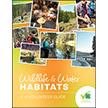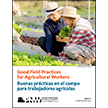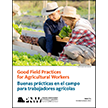Tools for Educators
Curricula
4H Wildlife and Water: Volunteer Guide
$6 This 20-page publication supplements the Wildlife and Water Habitats 4-H Youth Curriculum, a program that teaches middle school-age children about Idaho habitats. As a companion guide, it...
4H Wildlife and Water: Youth Guide
$19.50 This 124-page youth text and workbook teaches middle school-age children about Idaho habitats as part of a three-year course. An ongoing narrative involving the characters Emily and Logan...
Buenas prácticas en el campo para trabajadores agrícolas
Los trabajadores agrícolas, productores, and propietarios de frutas y hortalizas deben estar bien entrenadas en practicas que promuevan la salud y la higiene. Este manual bilingüe le ayuda a usted...
Building Healthy Eating Habits through Taste Testing in Early Childcare Centers
Getting kids to eat fruits and vegetables as part of a healthy practice is difficult, but not impossible. Mostly it's a matter of introducing these nutritious foods in fun and educational ways.
$45 Credit Cents was developed for educators who teach personal finance, consumer education or life skills to adults and teens. The curriculum covers credit basics, credit scores, how to take...
Elements & Principles of Design
$1 Created to be part of a 4-H art curriculum, this informational card will provide a continuous visual reference for both youth and adults learning about visual art. The Elements & Principles card...
Five for Five: Five Minutes to Better Health
Free Everyone knows that staying physically active improves one’s health. However, just under half of all adults in the United States don’t engage in regular exercise; even worse, nearly...
Good Field Practices for Agricultural Workers
The Pacific Northwest is known for its high-quality produce. To preserve this reputation, all people involved in farm activities should be thoroughly trained in practices that promote health and...
IDAH2O Playing Cards - Cleaner. Water. Faster.
$3 For grades K-12, this complete deck of playing cards includes grade-specific mini-lessons on watershed science topics in Idaho. Use them in classrooms and out-of-school settings. For more...
Indoor Container Garden (SEED)
The indoor container garden — SEED program provides youth with an experiential hands-on learning environment about gardening. This tool kit provides you all the basics, including a list of program...
Market Poultry Lesson Plans: From Egg To Animal
Raising animals is one of the foundational learning experiences for 4-H youth. Chickens are fairly easy for children to start with but there is a learning curve. This bulletin conveniently compiles...
Pest Friends is an educational strategy board game designed to help youth and adults understand the principles of Integrated Pest Management (IPM), an ecosystem-based approach for managing pests...
Rangeland Outreach Activities Manual
This guide was designed to prepare 4-H youth for the Idaho Rangeland Skill-a-thon event. This event is a hands-on, outdoor, science event designed to teach youth and adults about the vast rangeland...
Rangeland Outreach Activities Manual: Coaches' Edition
This guide was designed to help facilitators to prepare 4-H youth for the Idaho Rangeland Skill-a-thon event. This event is a hands-on, outdoor, science event designed to teach youth and adults...
$45 This retirement-planning CD-ROM curriculum helps midlife and older adults manage the financial and the nonfinancial aspects of their approaching retirements. The comprehensive curriculum...
Selling Logs from Your Property: A Curriculum Package for Educators in the Western U.S.
Selling logs is one of the most important decisions a landowner can face. This curriculum package for forestry educators brings together consulting foresters, log buyers and loggers to teach...
The Dollar Game: Play scenarios to grow a local economy
Learn how a community builds wealth by playing the Dollar Game, a role-playing exercise for team or individual play. The six-round, nontraditional educational program, which can be incorporated...
The Science of Chocolate: Satisfy Your Sweet Tooth
Making confections can be a yummy and fun educational experience for children. But for everyone to get the most out of it, you need patience and scientific knowledge. Satisfy Your Sweet Tooth, a...
The Science of Sugar: Satisfy Your Sweet Tooth
Making confections can be a yummy and fun educational experience for children. But for everyone to get the most out of it, you need patience and scientific knowledge. Satisfy Your Sweet Tooth, a...
Tobacco and Vaping Prevention Lesson
Since more young Idahoans are vaping (one-fifth have at least tried it), prevention is key. Using a Do, Reflect, Apply model, this 30-minute 4-H curriculum provides activities to help children...
Planning and Assessment
Building Healthy Eating Habits through Taste Testing in Early Childcare Centers
Getting kids to eat fruits and vegetables as part of a healthy practice is difficult, but not impossible. Mostly it's a matter of introducing these nutritious foods in fun and educational ways.
Logic Model for Program Planning and Evaluation
Describes how to use the logic model to identify elements of a program that are most likely to yield useful evaluation data and to identify a sequence for collecting data and measuring progress.
Cooperative Extension System professionals conduct needs assessments to learn about important issues and problems faced by our public in order to fill gaps and design effective educational programs...
The Science of Chocolate: Satisfy Your Sweet Tooth
Making confections can be a yummy and fun educational experience for children. But for everyone to get the most out of it, you need patience and scientific knowledge. Satisfy Your Sweet Tooth, a...
The Science of Sugar: Satisfy Your Sweet Tooth
Making confections can be a yummy and fun educational experience for children. But for everyone to get the most out of it, you need patience and scientific knowledge. Satisfy Your Sweet Tooth, a...
Women Farmers on the Rise? Understanding USDA Data-Collection Methods
Agricultural data collection in the United States has become more systematic since the first census report appeared in 1820. Conducted by the United States Department of Agriculture (USDA), the...





























